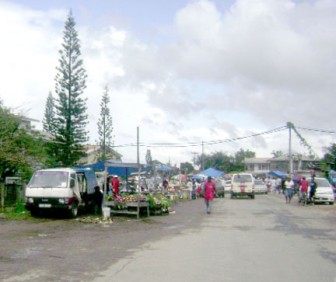 Nine miles from Vreed-en-Hoop is the village of Wales on the West Bank of Demerara. With a population of approximately 60 persons, the community is a sugar estate and the lifeline for several villages along the West Bank.
Nine miles from Vreed-en-Hoop is the village of Wales on the West Bank of Demerara. With a population of approximately 60 persons, the community is a sugar estate and the lifeline for several villages along the West Bank.
However, that is only Wales proper. The area stretching from Sisters on the one side, to Patentia on the other, is also referred to as Wales, because the farmlands of these communities were once estate lands. The population of this larger area numbers over ten thousand.
The sugar estate factory is a looming structure and the first thing one notices upon entering the village. In fact, Wales basically consists of the sugar factory, the molasses plant, estate houses for the “big ones,” a dispensary, the police station, the primary school and the post office – which is actually located in Sisters.
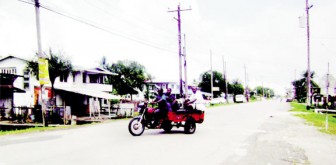
The entire area is described as a “big farming community” and everyone depends directly or indirectly on the estate for a means of living.
A foreman of the estate, Terry Ramnarine, said that 90 per cent of the population of Wales depends on sugar – from the private farmers to the cane cutters and even the vendors who come for market day.
Ramnarine noted that the village is usually buzzing when the mills are working. Behind him rows of cut cane in trailers were waiting to be ground. In a canal, empty punts also sat idle. Ramnarine explained that the mill cannot begin to grind the canes until there are over 80 trailers and about 130 punts of cane. “Things are slow right now,” he admits. He said that it was because of the rains that the factory was not working. There was not enough cane being brought in.
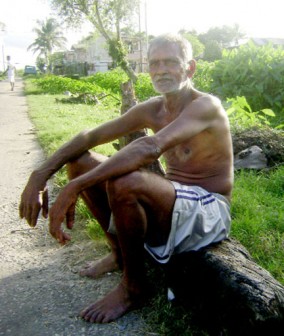
“When the factory is not working the place is empty. When the estate grind the place is bright,” Ramnarine said. “The community is affected a lot when sugar is slow.”
Across the street from the factory are the molasses plant and a docking area for boats. Orlando Hinds who is a security guard with the estate explained that persons would come to the plant to collect molasses.
Hinds, who lives in Patentia said that the community “is a very nice place.”
“Everyone here knows each other,” he added. Hinds said he has been working with the estate for only six months. He used to work in Georgetown, but took the security job at the estate to be closer to home.
He too said that the community is usually a quiet one but comes alive on market day, which is held on Fridays because that is the day that the factory workers get paid.
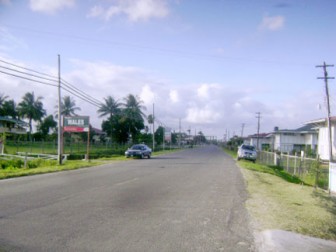
Over in the village of Sisters, 63-year- old Seokumar Singh sits on a log across from his home playing with his granddaughter in the quiet back street. The afternoon sun is warming and the community is alive with persons doing their afternoon chores.
From where Singh sits, the sugarcane field behind the Wales Primary School is visible waiting to be harvested. Singh says he has been living in Sisters for 32 years, “When me live at the back hey was bush and mud; you had to weed fuh come out to the front.”
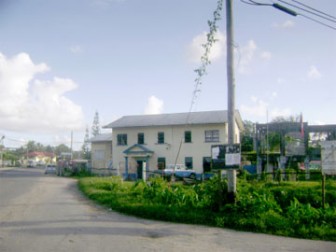
Now a pensioner, Singh was a cane cutter with the Wales Sugar Estate for 34 years. Being a cane cutter is no easy task, Singh said. “Now different far from me time. Now they wuking fuh lil bit money and then the weather…” he shakes his head.
A pup comes over and distracts Singh for a bit. Petting the puppy a little Singh expressed the view that the current situation with the sugar workers striking is not good for the sugar industry or the workers. Singh said he hoped “GuySuCo and the union come to ah agreement.”
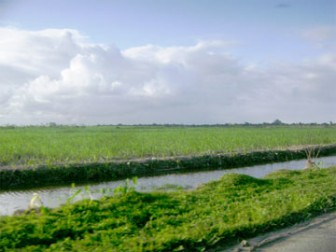
He too noted that the community is usually a quiet one but “place ah busy when the mill wukking, them ah glad. Everybody who selling and thing depend pun um.”
Back on the public road, young boys hang out in front of the post office which is closed.
Market day
On market day, the community is abuzz with persons shopping and vendors offering their wares. Vendors set up stall on the roadside just at the entrance to Wales and in School Street, Wales more
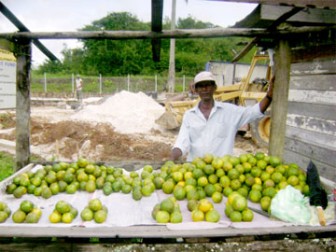
permanent stalls can be found.
A mobile CD cart blasts music as shoppers walk around getting their weekend groceries. Freshly cut beef is in a small canter in front of the police station. Across the road household utensils, apparel and other items are displayed.
Sonny, 64, is from Vriesland, a village further away from Wales. Sonny is a farmer who used to work at the estate as a cane cutter. “I worked at the estate from ’71 to ’83 time. Back in the ’80s they had laid
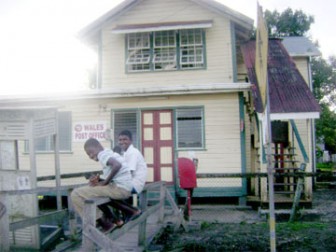
some of us off and then in the ’90s I work back with them again before I start collecting my pension.”
Sonny, who grows various crops such as citrus and ground provisions, says that when he harvests his crop he takes it to the market to sell “to catch a lil hand,” because “the pension money is not enough.” The Wales market is one of several to which he takes his produce.
His stall sits between that of another fruit vendor selling a variety of fruits, and a butcher. Behind the
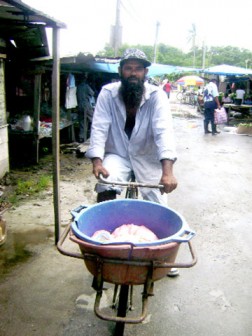
vendors men are at work constructing a well which is expected to service Wales to Bell Vue.
Through School Street, retired police inspector, Yvonne Liverpool said she took to vending to “have something to do.” Liverpool sells dry goods, and says she “born and grow” in the area.
Although the community is mainly a farming one, she said she wanted to do something different.
Giving a little history lesson on the communities that make up Wales, Liverpool said, “From Bell Vue they call Wales because the estate name is Wales. Most persons in the days gone by depended on the estate. The land was estate land but was given out to the people later on so they could farm the land and the estate would provide transportation.”
She said that in Belle Vue some of the lands were converted into the Belle Vue Housing Scheme and
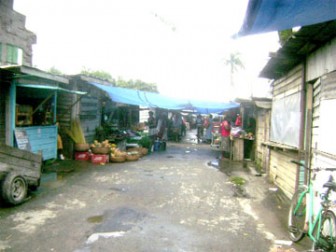
those that remained under cane were planted by private farmers who formed an association. They sold their cane to the estate for it to be ground.
Passing Liverpool’s stall doing his shopping was fisherman Mohamed Ramjan who had earlier finished selling his catch. Ramjan said that he has been working since he was 13 years old. He first worked at a sawmill but injured his right hand.
He said that he could never get employment because of his hand which was left mangled from the
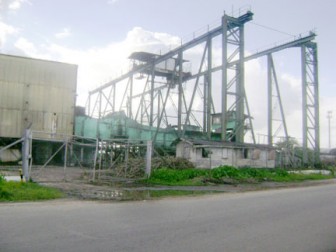
accident. However he was given a job on a fishing vessel and has not looked back since. A deep sea fisherman Ramjan said he was grateful for the job. “I love fishing,” he said.
He said that the village of Sisters “aint peaceful when the people drink they rum. It is a good village but the young one dem aint get no regard…”
There are many small businesses throughout the community, including roadside barbers, cell-phone and hardware shops, restaurants, variety stores and a document centre offering
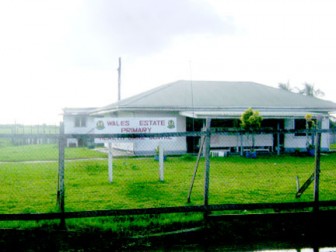
photocopying services and the like.
A health centre in Good Intent, which is a village away from Sisters, treats minor ailments and makes referrals to the West Demerara Hospital in more serious cases.
Besides the one primary school in Wales itself, there is a nursery school in Patentia and another in Sisters as well as a secondary school in Patentia. Residents don’t have much to complain about, they said. The people tend to “look out” for each other and as one resident put
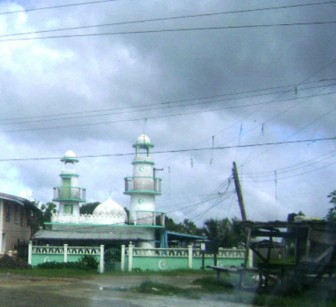
it, “we does come together when something happen to we own.”
